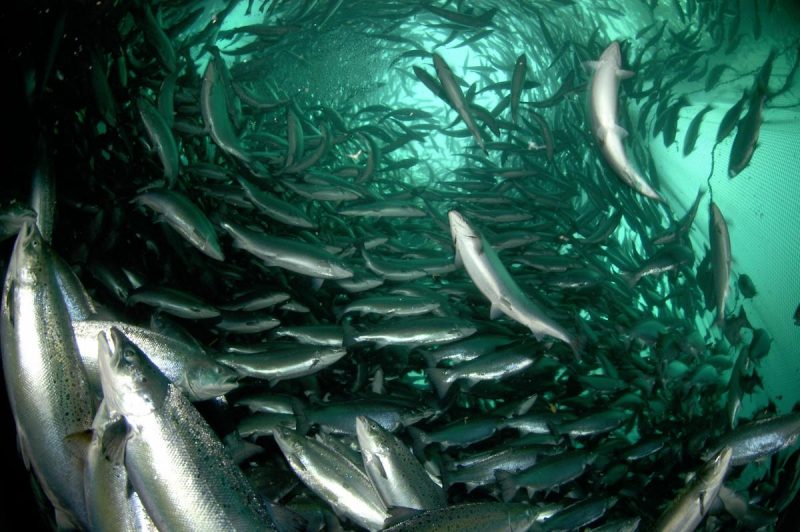Salmon farmers relying less on wild fish for feed
Salmon farmers make good progress to reduce their reliance on wild-caught fish in the feed they use, states a new report
By SeaWestNews
Atlantic salmon farmers around the world and here in BC are reducing their reliance on wild-caught fish in the feed they use, helping to reduce the pressure on wild stocks, according to the Aquaculture Stewardship Council (ASC) Seafood Monitoring and Evaluation report.
The report found ASC certified salmon farms have seen a decrease in their average inclusion rates for both fishmeal and fish oil from wild-caught sources, from 15.4% in 2015 to 12.3% in 2018 for fishmeal and from 10.1% in 2015 to 8.7% in 2018 for fish oil.
“These values demonstrate the increasing efficiency of certified farms in the ASC programme,” said the Council, an independent organisation co-founded by the World Wildlife Fund (WWF) to manage the certification of responsible fish farming across the globe.
“Reporting on our impact is a key part of the ASC mission, and this report demonstrates the value of transparency in a certification programme,” said Jill Swasey, Head of Monitoring and Evaluation at ASC.
“ASC certified farms must go above and beyond when it comes to publicising their performance data.”
Shawn Hall, spokesperson for the BC Salmon Farmers Association said 51 salmon farms in BC have achieved ASC certification, which is about 80 per cent of active production sites in the province.
“We’re on our way to 100 per cent certification in the near future,” he said.
Achieving ASC certification is a challenging, farm-by-farm process requiring each operation to meet more than 150 distinct measures across diverse categories such as sea lice management, use of antibiotics, feed, interactions with wildlife, labour, and working with Indigenous peoples. It is the most stringent aquaculture certification in the world.
“ASC is not static, but requires a continual, audited drive for improvement across our operations. Feed is a good example of that work,” said Hall.
Over the past several years, the suppliers of feed for B.C. farm-raised salmon have taken great strides to reduce the amount of fishmeal and fish oils in their aquafeeds, while still maintaining nutritional value and traceability of their marine ingredients.
On average, current salmon feeds contain less than 15% fishmeal and fish oil. To further help reduce the impact on marine derived ingredients, providers make an effort to incorporate fish trimmings from wild harvest processing into feed where possible. This further reduces dependence upon wild fisheries as sources of marine ingredients B.C. salmon feed producers have decreased the dependency on wild pelagic fish (e.g. anchovies and herring) for fishmeal and fish oil in feeds substantially over the past 5 years.
Since 2013, the dependency on wild pelagic fish for fishmeal has dropped by 25% and for fish oil has dropped by 32%. About three-quarters of all raw materials sourced for salmon feeds come from within Canada and the United States.
Hall said research into the use of insect meal is showing early promise, and will likely allow salmon farmers to reduce that percentage even further in the near future.
Other findings in ASC’s first Monitoring and Evaluation (M&E) report include:
- Shrimp farms in India and Vietnam have improved how they monitor their energy use and greenhouse gas emissions as a result of certification;
- Indian shrimp farms show marked improvement in community relations – this is due to better communicating with local communities and sharing conflict resolution policies;
- Nearly 18,000 products were able to carry the ASC logo around the world through 2019, a 380% increase in five years;
- Over 1,100 farms certified (across nine standards) in 42 countries producing nearly 2m tons of seafood by the end of 2019;
- Almost 13,000 people are working on ASC certified farms around the world, where they are protected by the ASC’s social requirements.
(photo courtesy of the Aquaculture Stewardship Council)

